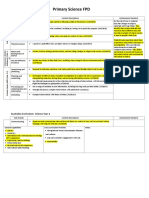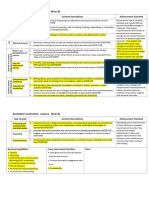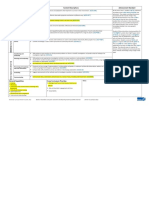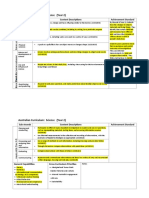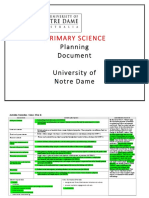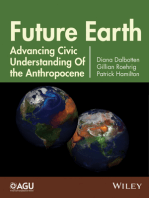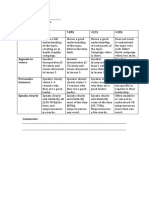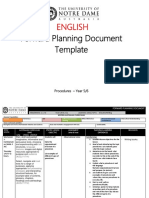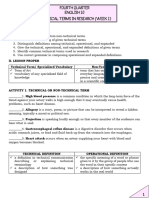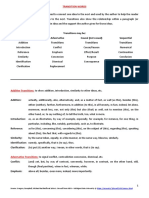Year 6 Overview-2
Year 6 Overview-2
Uploaded by
api-350585868Copyright:
Available Formats
Year 6 Overview-2
Year 6 Overview-2
Uploaded by
api-350585868Original Title
Copyright
Available Formats
Share this document
Did you find this document useful?
Is this content inappropriate?
Copyright:
Available Formats
Year 6 Overview-2
Year 6 Overview-2
Uploaded by
api-350585868Copyright:
Available Formats
Australian Curriculum: Science (Year 6)
Sub-strands Content Descriptions Achievement Standard
Biological sciences The growth and survival of living things are affected by the physical conditions of their environment (ACSSU094) By the end of Year 6, students compare and
classify different types of observable changes to
materials. They analyse requirements for the
Chemical sciences Changes to materials can be reversible, such as melting, freezing, evaporating; or irreversible, such as burning and rusting (ACSSU095) transfer of electricity and describe how energy can
Science understanding
be transformed from one form to another to
generate electricity. They explain how natural
Earth and space sciences Sudden geological changes or extreme weather conditions can affect Earths surface (ACSSU096) events cause rapid change to the Earths surface.
They describe and predict the effect of
environmental changes on individual living things.
Physical sciences Electrical circuits provide a means of transferring and transforming electricity (ACSSU097) Students explain how scientific knowledge is used
Energy from a variety of sources can be used to generate electricity (ACSSU219) in decision making and identify contributions to the
development of science by people from a range of
Science involves testing predictions by gathering data and using evidence to develop explanations of events and phenomena (ACSHE098) cultures.
Nature and development
of science Important contributions to the advancement of science have been made by people from a range of cultures (ACSHE099)
Students follow procedures to develop investigable
as a human endeavour
questions and design investigations into simple
cause-and-effect relationships. They identify
Scientific understandings, discoveries and inventions are used to solve problems that directly affect peoples lives (ACSHE100) variables to be changed and measured and
Use and influence of
science Scientific knowledge is used to inform personal and community decisions (ACSHE220) describe potential safety risks when planning
methods. They collect, organise and interpret their
data, identifying where improvements to their
methods or research could improve the data. They
(Year 5-6)
describe and analyse relationships in data using
Science
graphic representations and construct multi-
modal texts to communicate ideas, methods and
Questioning and With guidance, pose questions to clarify practical problems or inform a scientific investigation, and predict what the findings of an investigation findings.
predicting might be (ACSIS232)
Planning and conducting With guidance, plan appropriate investigation methods to answer questions or solve problems (ACSIS103)
Decide which variable should be changed and measured in fair tests and accurately observe, measure and record data, using digital technologies
as appropriate (ACSIS104)
Science inquiry skills (Year 5-6)
Use equipment and materials safely, identifying potential risks (ACSIS105)
Processing and analysing Construct and use a range of representations, including tables and graphs, to represent and describe observations, patterns or relationships in
data and information data using digital technologies as appropriate (ACSIS107)
Compare data with predictions and use as evidence in developing explanations (ACSIS221)
Evaluating Suggest improvements to the methods used to investigate a question or solve a problem (ACSIS108)
Communicating Communicate ideas, explanations and processes in a variety of ways, including multi-modal texts (ACSIS110)
General Capabilities Cross Curriculum Priorities Notes:
Literacy Aboriginal and Torres Strait Islander histories and cultures
Numeracy Asia and Australias engagement with Asia
Information and communication technology (ICT) competence Sustainability
Critical and creative thinking
Ethical behaviour
Personal and social competence
Intercultural understanding
You might also like
- Sociological Theory - Study Guide For Max WeberNo ratings yetSociological Theory - Study Guide For Max Weber3 pages
- Primary Science FPD: Australian Curriculum: Science (Year 6)No ratings yetPrimary Science FPD: Australian Curriculum: Science (Year 6)12 pages
- Science: Planning Document University of Notre DameNo ratings yetScience: Planning Document University of Notre Dame15 pages
- Earth Space Science-Fpd DwesterhoutfinalNo ratings yetEarth Space Science-Fpd Dwesterhoutfinal15 pages
- Primary Science FPD: Australian Curriculum: Science (Year 6)No ratings yetPrimary Science FPD: Australian Curriculum: Science (Year 6)7 pages
- Australian Curriculum: Science (Year 5) : Sub-Strands Content Descriptions Achievement StandardNo ratings yetAustralian Curriculum: Science (Year 5) : Sub-Strands Content Descriptions Achievement Standard2 pages
- Adaptations FPD - Year 5 Biological SciencesNo ratings yetAdaptations FPD - Year 5 Biological Sciences12 pages
- Primary Science FPD: Australian Curriculum: Science (Year 5)No ratings yetPrimary Science FPD: Australian Curriculum: Science (Year 5)2 pages
- Australian Curriculum: Science (Year 3) : Sub-Strands Content Descriptions Achievement StandardNo ratings yetAustralian Curriculum: Science (Year 3) : Sub-Strands Content Descriptions Achievement Standard2 pages
- Planning Document University of Notre Dame: ScienceNo ratings yetPlanning Document University of Notre Dame: Science13 pages
- Science Planning Document Primary & Secondary University ofNo ratings yetScience Planning Document Primary & Secondary University of10 pages
- Australian Curriculum: Science (Year 3) : (ACSSU046)No ratings yetAustralian Curriculum: Science (Year 3) : (ACSSU046)2 pages
- Australian Curriculum: Science (Year 4) : Sub-Strands Content Descriptions Achievement StandardNo ratings yetAustralian Curriculum: Science (Year 4) : Sub-Strands Content Descriptions Achievement Standard9 pages
- Science: Planning Document University of Notre DameNo ratings yetScience: Planning Document University of Notre Dame11 pages
- Science-Forward-Planning-Document-Patrick FinalNo ratings yetScience-Forward-Planning-Document-Patrick Final8 pages
- Example FPD: Primary Science: Australian Curriculum: Science (Year 4)100% (1)Example FPD: Primary Science: Australian Curriculum: Science (Year 4)7 pages
- Future Earth: Advancing Civic Understanding of the AnthropoceneFrom EverandFuture Earth: Advancing Civic Understanding of the AnthropoceneNo ratings yet
- Quarter 4 Week 1 Technical Terms in ResearchNo ratings yetQuarter 4 Week 1 Technical Terms in Research7 pages
- Aquinas On Virtue - A Causal Re - Austin, Nicholas, S.J. - 7401100% (5)Aquinas On Virtue - A Causal Re - Austin, Nicholas, S.J. - 7401258 pages
- An Introduction To Philosophy of ScienceNo ratings yetAn Introduction To Philosophy of Science6 pages
- Reiner Schürmann - The Ontological DiferenceNo ratings yetReiner Schürmann - The Ontological Diference25 pages
- This Content Downloaded From 212.191.80.243 On Sat, 18 Mar 2023 22:19:06 UTCNo ratings yetThis Content Downloaded From 212.191.80.243 On Sat, 18 Mar 2023 22:19:06 UTC35 pages
- The Place of Policy Analysis in Political ScienceNo ratings yetThe Place of Policy Analysis in Political Science19 pages
- Sutherland, Edwin White Collar CriminalityNo ratings yetSutherland, Edwin White Collar Criminality13 pages
- A Cicchetti - Development and PsychopathologyNo ratings yetA Cicchetti - Development and Psychopathology23 pages
- Cross-Sectional and Longitudinal Survey ResearchNo ratings yetCross-Sectional and Longitudinal Survey Research21 pages
- (GIBBONS BUNDERSON, 2005) Explore, Explain, DesignNo ratings yet(GIBBONS BUNDERSON, 2005) Explore, Explain, Design12 pages



